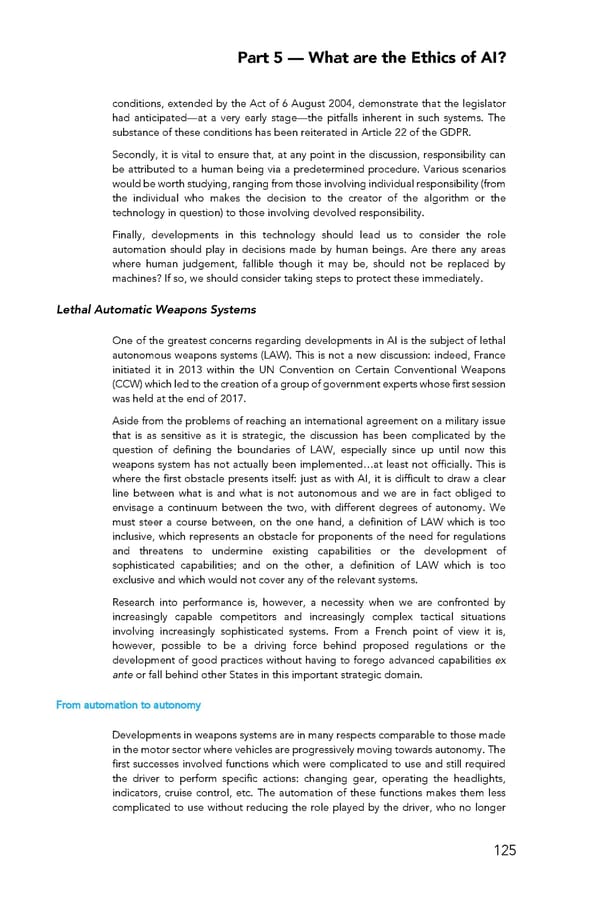Part 5 — What are the Ethics of AI? conditions, extended by the Act of 6 August 2004, demonstrate that the legislator had anticipated—at a very early stage—the pitfalls inherent in such systems. The substance of these conditions has been reiterated in Article 22 of the GDPR. Secondly, it is vital to ensure that, at any point in the discussion, responsibility can be attributed to a human being via a predetermined procedure. Various scenarios would be worth studying, ranging from those involving individual responsibility (from the individual who makes the decision to the creator of the algorithm or the technology in question) to those involving devolved responsibility. Finally, developments in this technology should lead us to consider the role automation should play in decisions made by human beings. Are there any areas where human judgement, fallible though it may be, should not be replaced by machines? If so, we should consider taking steps to protect these immediately. Lethal Automatic Weapons Systems One of the greatest concerns regarding developments in AI is the subject of lethal autonomous weapons systems (LAW). This is not a new discussion: indeed, France initiated it in 2013 within the UN Convention on Certain Conventional Weapons (CCW) which led to the creation of a group of government experts whose first session was held at the end of 2017. Aside from the problems of reaching an international agreement on a military issue that is as sensitive as it is strategic, the discussion has been complicated by the question of defining the boundaries of LAW, especially since up until now this weapons system has not actually been implemented…at least not officially. This is where the first obstacle presents itself: just as with AI, it is difficult to draw a clear line between what is and what is not autonomous and we are in fact obliged to envisage a continuum between the two, with different degrees of autonomy. We must steer a course between, on the one hand, a definition of LAW which is too inclusive, which represents an obstacle for proponents of the need for regulations and threatens to undermine existing capabilities or the development of sophisticated capabilities; and on the other, a definition of LAW which is too exclusive and which would not cover any of the relevant systems. Research into performance is, however, a necessity when we are confronted by increasingly capable competitors and increasingly complex tactical situations involving increasingly sophisticated systems. From a French point of view it is, however, possible to be a driving force behind proposed regulations or the development of good practices without having to forego advanced capabilities ex ante or fall behind other States in this important strategic domain. From automation to autonomy Developments in weapons systems are in many respects comparable to those made in the motor sector where vehicles are progressively moving towards autonomy. The first successes involved functions which were complicated to use and still required the driver to perform specific actions: changing gear, operating the headlights, indicators, cruise control, etc. The automation of these functions makes them less complicated to use without reducing the role played by the driver, who no longer 125
 For a Meaningful AI - Report Page 124 Page 126
For a Meaningful AI - Report Page 124 Page 126